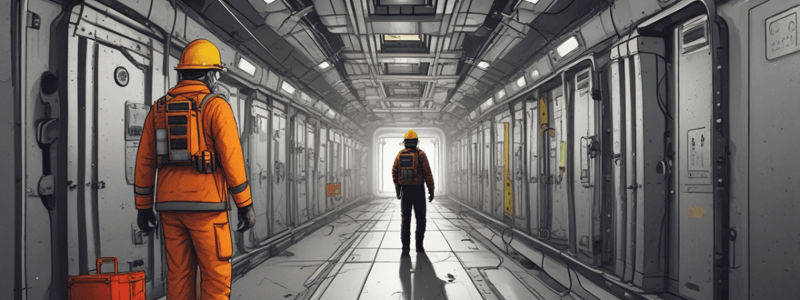Podcast
Questions and Answers
What was the main cause of the engine failure in the CTV?
What was the main cause of the engine failure in the CTV?
- Worn-out carbon brushes in the motor of the pitch control propulsion actuator (correct)
- Insufficient routine checks and tests prior to operations
- Lack of experience of the vessel crew
- Failure of the emergency stop system
What was the consequence of the engine failure?
What was the consequence of the engine failure?
- The vessel caught fire due to the engine failure
- The crew was injured during the incident
- The vessel lost power and drifted away from the platform
- The vessel collided with the platform, causing damage to the starboard side of the wheelhouse (correct)
What did the vessel crew do correctly prior to the incident?
What did the vessel crew do correctly prior to the incident?
- They completed their routine checks and tests prior to operations (correct)
- They stopped the vessel immediately after the engine failure
- They reduced the speed of the vessel to avoid collision
- They ignored the warning signs of engine failure
What was lacking in the maintenance system of the vessel?
What was lacking in the maintenance system of the vessel?
What did the Master do immediately after the engine failure?
What did the Master do immediately after the engine failure?
Flashcards are hidden until you start studying
Study Notes
Confined Space Entry Incidents
- A worker entered a confined space without proper authorization and fell ill, requiring CPR.
- The crew failed to stop the job and allowed the worker to enter the confined space without proper supervision.
- The company's existing confined space entry policies were not complied with.
- Human factors, such as feeling rushed, led to hasty and ill-informed decisions.
###Actions and Recommendations
- Conduct additional refresher training for confined space rescue.
- Implement safety stand downs to stop and think before entering confined spaces.
- Install appropriate personnel barriers.
- Ensure management meets with supervisors to review policies and procedures before every job.
BSEE Safety Alert 477
- The US Bureau of Safety and Environmental Enforcement (BSEE) has published a safety alert regarding confined space entry during tank cleaning operations.
- BSEE recommends that operators and contractors ensure personnel understand what constitutes a confined space and the hazards associated with it.
- A Job Safety Analysis (JSA) should be in place and discussed before starting work.
- A confined space entry Permit to Work should be completed, explaining the hazards and mitigations.
- Stopping the job and discussing potential safety and environmental hazards is crucial.
- Proper personal protective equipment (PPE) should be worn.
- Means of communication should be established between personnel inside and outside the confined space.
- Regular communication can detect if personnel inside the confined space have become impaired.
Crane Wire Rope Failure
- The US Coast Guard (USCG) investigation revealed that corrosion, wear, and monotonic ductile overload caused wire rope failure.
- The USCG recommends that vessel operators implement increased load testing frequency, utilize pressure lubricating devices, and ensure maintenance tracking systems align with manufacturer's recommended maintenance protocol.
- Vessel operators should also consider shortened periods of employment and early renewal of crane wire ropes to prevent corrosion and fatigue induced failures.
- Instruct and train all personnel to never position themselves under cargo suspended by any crane.
Vessel Damaged in Contact with Platform
- A crew transfer vessel (CTV) collided with a fixed platform when one of the engines failed.
- The vessel crew completed routine checks and tests prior to operations in the 500-meter zone.
- The Master made several immediate attempts to regain control, including an emergency stop of the port inner main engine.
- The vessel's port inner main engine got stuck in forward movement due to a failure of the pitch control propulsion actuator.
- The actuator froze because of worn-out carbon brushes in a motor.
Studying That Suits You
Use AI to generate personalized quizzes and flashcards to suit your learning preferences.




